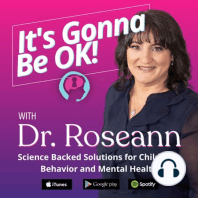4 min listen

141: Academic Success Strategies for the Neurodivergent Child
FromScience Backed Solutions for Children’s Behavior and Mental Health
141: Academic Success Strategies for the Neurodivergent Child
FromScience Backed Solutions for Children’s Behavior and Mental Health
ratings:
Length:
19 minutes
Released:
Nov 22, 2023
Format:
Podcast episode
Description
Neurodivergent children encompass a wide range of conditions, from ADHD and autism to anxiety, depression, and more, all of which influence how they learn and engage with the educational system. They usually encounter distinct challenges in achieving academic success as their unique cognitive and emotional profiles require a different approach. This episode highlights the innovative strategies and support systems that can unlock the potential of neurodivergent children, and acknowledge the crucial roles parents, educators, and other allies play in enabling these children to thrive and excel. Whether your child faces challenges like ADHD, autism, mental health issues, anxiety, depression, or OCD, these strategies can be a game-changer. Individualized learning plans for neurodivergent students.Structured routines play a pivotal role in the academic success of neurodivergent children. Individualized Learning Plans (IEPs) are crucial, distinct from 504 Accommodation Plans, as they focus on what interventions and direct instructions a child needs to enhance their learning experience. Special education, building plans, and 504 plans are geared toward determining necessary accommodations for these learners. While some parents worry about labeling their child, these labels can be empowering, opening doors to tailored support for conditions like autism or ADHD.One particularly effective brain hack for learning is the implementation of multi-sensory teaching techniques. Neurodivergent children often thrive when they are taught in a way that aligns with their individual learning styles, which can differ from their parents or caregivers. These approaches encompass kinesthetic, visual, and auditory elements, with most neurodivergent learners benefiting significantly from kinesthetic activities that involve movement. Experimenting with these techniques at home, such as incorporating movement and various sensory inputs, can help neurodivergent children absorb information more effectively and find success in their academics.Dyslexia, movement breaks, and explicit teaching strategies.Multi-sensory techniques are essential for children with dyslexia and similar challenges in reading programs, aligning with their preferred learning methods. Despite occasional resistance from well-intentioned adults, regular movement breaks play a crucial role in oxygenating the brain and enhancing attention, especially during the transition from school to homework.Optimal movement breaks, including moderate to vigorous exercise, are recommended every 15 to 20 minutes during learning sessions. Moreover, sensory tools like seat wedges can stimulate engagement but should be varied to maintain their effectiveness. These strategies extend their benefits beyond children and are beneficial for adults as well.Explicit teaching is another vital aspect of supporting neurodivergent learners. Parents sometimes encounter frustration when they overlook providing clear, explicit instructions. It's important to recognize that an individual's IQ is merely a number, and specific deficits may require explicit instruction, not only in academics but also in areas like social and attention. Making the implicit explicit is crucial for understanding expectations, whether in academic tasks or daily routines. Clear, well-defined guidelines, and rubrics are invaluable tools that offer benefits not confined to children but also extend their assistance to adults, contributing to the establishment of structured and dependable routines. These explicit directives provide a sense of predictability and organization in everyday existence. For children, these guidelines lay out a precise path for their tasks and obligations, nurturing a feeling of responsibility and aiding them in navigating the intricacies of their academic and personal duties.Adults can also derive substantial...
Released:
Nov 22, 2023
Format:
Podcast episode
Titles in the series (100)
It's Gonna Be Ok! by Science Backed Solutions for Children’s Behavior and Mental Health